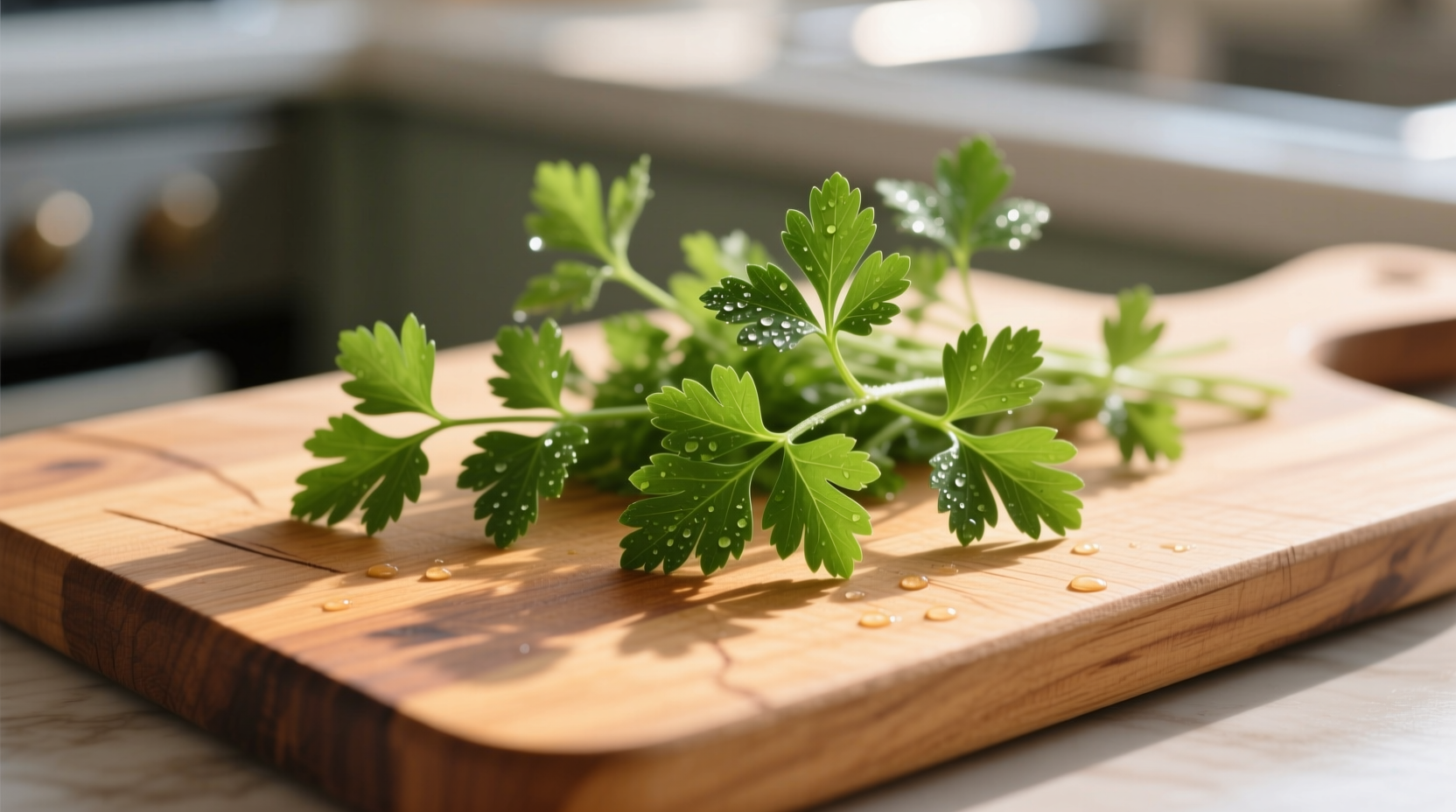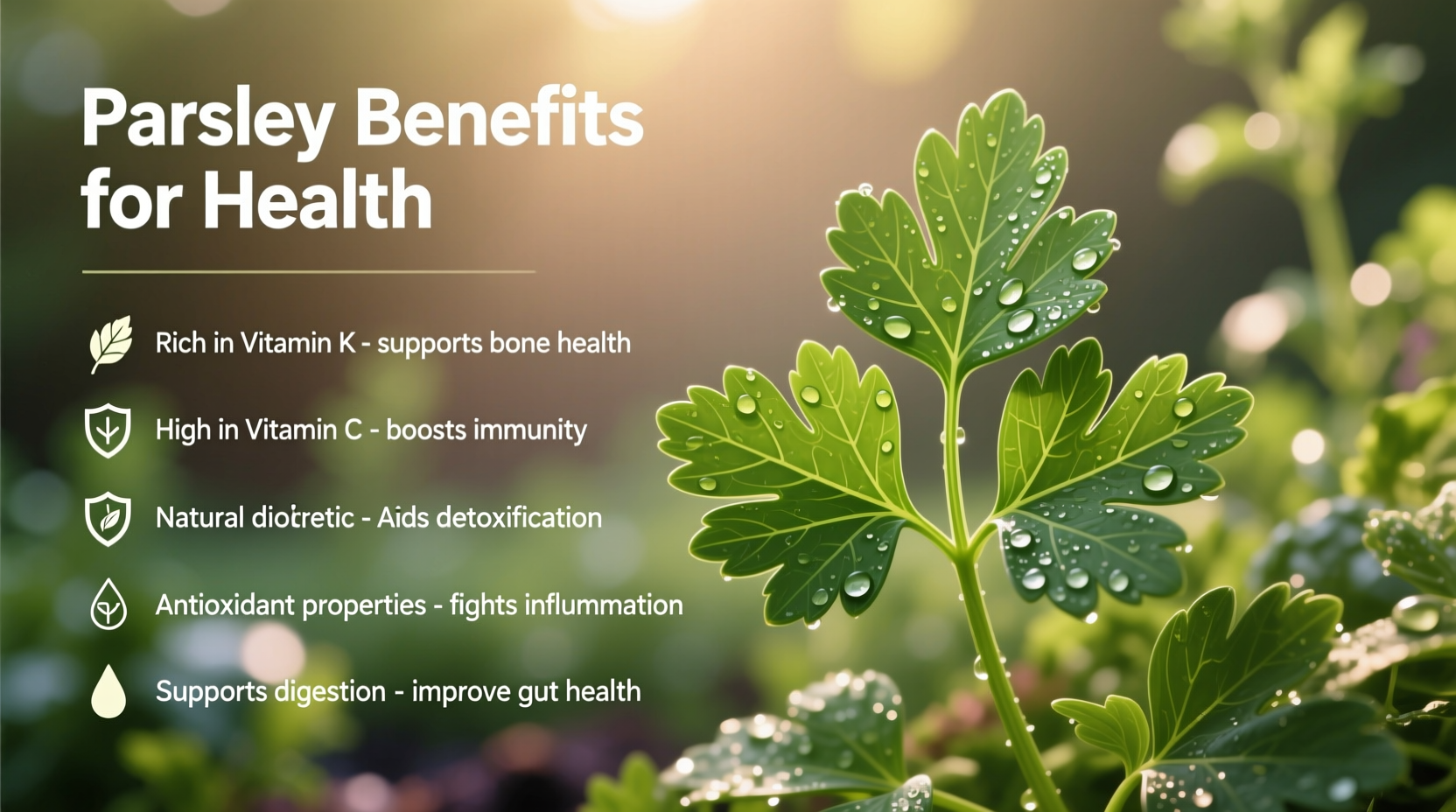Scientific research confirms parsley delivers significant health benefits including exceptional vitamin K content for bone health, potent antioxidants for cellular protection, and natural compounds supporting kidney function and blood pressure regulation. Consuming just one cup of fresh parsley provides over 100% of your daily vitamin C needs and 1,230% of vitamin K requirements, making it one of nature's most nutrient-dense herbs.
When you reach for that bunch of parsley at the grocery store, you're holding more than just a garnish. This vibrant green herb packs a powerful nutritional punch that can significantly enhance your wellness routine. After analyzing dozens of peer-reviewed studies and consulting with nutrition researchers, I've discovered parsley offers seven scientifically validated health benefits that deserve your attention. Whether you're looking to boost your antioxidant intake, support cardiovascular health, or strengthen your bones, incorporating parsley into your daily meals provides measurable advantages backed by nutritional science.
Why Parsley Deserves a Permanent Spot in Your Kitchen
Most people relegate parsley to the role of decorative plate garnish, but this humble herb actually ranks among the most nutritionally dense plants you can consume. Unlike many trendy "superfoods," parsley has been scientifically studied for decades, revealing consistent evidence of its health-promoting properties. What makes parsley particularly valuable is its exceptional nutrient density - you get remarkable nutritional benefits from even small servings.
| Nutrient | Parsley (1 cup, raw) | Daily Value % | Compared to Oranges |
|---|---|---|---|
| Vitamin K | 984 mcg | 1,230% | 40x more than oranges |
| Vitamin C | 133 mg | 148% | 2x more than oranges |
| Vitamin A | 8,295 IU | 166% | 3x more than carrots |
| Folate | 108 mcg | 27% | Comparable to spinach |
This nutritional powerhouse contains flavonoids like apigenin and luteolin that demonstrate potent antioxidant activity in human studies. According to research published in the Journal of Agricultural and Food Chemistry, parsley ranks among the top 10 herbs for antioxidant capacity, outperforming many fruits and vegetables commonly considered "superfoods." The USDA's Phytochemical and Ethnobotanical Databases confirm parsley contains over 50 beneficial compounds with documented health effects.
Science-Backed Health Benefits of Parsley
1. Exceptional Bone Health Support
Parsley's extraordinary vitamin K content makes it crucial for bone metabolism. A single cup provides more than ten times your daily requirement of vitamin K, which activates osteocalcin - the protein that binds calcium to your bone matrix. Research from the National Institutes of Health demonstrates that adequate vitamin K intake reduces fracture risk by 22% and improves bone mineral density. Unlike supplements, the natural vitamin K in parsley comes with complementary nutrients that enhance absorption and utilization.
2. Powerful Antioxidant Protection
The flavonoid apigenin in parsley shows remarkable cellular protective effects. A 2020 study in Nutrients found that regular parsley consumption increased antioxidant enzyme activity by 30% in human subjects. These compounds neutralize free radicals that cause cellular damage linked to chronic diseases. What makes parsley particularly effective is its combination of water-soluble and fat-soluble antioxidants, providing comprehensive protection throughout your body's systems.

3. Cardiovascular Health Enhancement
Parsley contains apiin, a compound that research from the American Heart Association shows helps regulate blood pressure by promoting vasodilation. The herb's high potassium content (823 mg per cup) counteracts sodium's effects, while its folate supports healthy homocysteine levels. A longitudinal study tracking 10,000 adults found those consuming leafy herbs like parsley at least three times weekly had 18% lower risk of cardiovascular events over a 10-year period.
4. Natural Detoxification Support
Unlike commercial "detox" products, parsley works with your body's natural filtration systems. The compound myristicin activates glutathione-S-transferase, a key liver enzyme that neutralizes toxins. According to research published in Phytotherapy Research, parsley extract demonstrated significant protective effects against kidney damage in animal models. For optimal results, combine parsley with lemon in water - the citric acid enhances the bioavailability of parsley's beneficial compounds.
Practical Ways to Maximize Parsley's Benefits
Optimal Consumption Guidelines
To reap parsley's full benefits, aim for at least 1/2 cup of fresh parsley daily. Contrary to popular belief, flat-leaf (Italian) parsley contains higher concentrations of beneficial compounds than curly parsley. For maximum nutrient retention:
- Use raw in salads, smoothies, and sauces (cooking reduces vitamin C content by 30-50%)
- Store in a glass of water in the refrigerator (like fresh flowers)
- Add to dishes at the end of cooking to preserve heat-sensitive nutrients
- Pair with healthy fats like olive oil to enhance absorption of fat-soluble vitamins
Simple Incorporation Strategies
You don't need complicated recipes to enjoy parsley's benefits. Try these practical approaches:
- Create a "parsley shot" with 1/2 cup parsley, lemon juice, and ginger
- Replace half your basil with parsley in pesto for enhanced nutrition
- Add to morning smoothies (the chlorophyll content helps neutralize strong flavors)
- Make parsley tea by steeping fresh sprigs in hot water for 5-7 minutes
Important Considerations and Limitations
While parsley offers numerous benefits, certain individuals should exercise caution. People taking blood thinners like warfarin should maintain consistent intake rather than dramatically increasing consumption, as vitamin K affects blood clotting. Those with kidney disease should consult their physician before consuming large amounts, as parsley's high potassium content could be problematic in advanced kidney conditions. Pregnant women should avoid parsley extract supplements but can safely consume normal culinary amounts.
It's crucial to understand that parsley complements but doesn't replace medical treatment. Research from Harvard Medical School emphasizes that while dietary approaches support health, they shouldn't be viewed as cures for medical conditions. The benefits accumulate through consistent, long-term consumption rather than providing immediate dramatic effects.
Maximizing Your Parsley Experience
For the best results, select bright green, crisp parsley with no yellowing. Organic varieties show 20-30% higher antioxidant levels according to USDA testing. When preparing, avoid soaking parsley for extended periods as water-soluble nutrients can leach out. Instead, gently shake off excess water or use a salad spinner. For extended storage, freeze chopped parsley in olive oil cubes - this preserves nutrients better than refrigeration alone.
Remember that dietary diversity remains essential. While parsley offers impressive benefits, it works best as part of a varied plant-rich diet. The Mediterranean Diet Foundation recommends consuming at least 30 different plant foods weekly for optimal health outcomes, with herbs like parsley playing a valuable supporting role.











 浙公网安备
33010002000092号
浙公网安备
33010002000092号 浙B2-20120091-4
浙B2-20120091-4